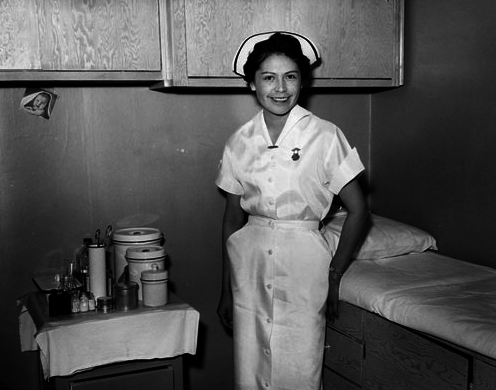The official formation of the Canadian Indigenous Nurses Association (C.I.N.A.) was in 1975 as Registered Nurses, Indian and Inuit Association of Canada. However, its origins precede this historic date by one year. In 1974 the groundwork was started for the actual formation of the association by several nurses who shared a common vision founded in their unique perspective as Indigenous caregivers to Indigenous people.

The initial task facing two proponents of the organization, nurses Jocelyn Bruyere and Jean Goodwill, were to identify and contact other nurses of Indigenous ancestry. This in itself proved to be a major undertaking since at the time there was no existing registry to help locate nurses according to their ancestry. However, through word of mouth and a lot of networking, a preliminary list of Indigenous nurses was developed.
Almost a year later, 41 of these nurses came together in Montreal to discuss their common role in addressing the many health problems affecting Indigenous People. Their commonalities in education and training, cultural background and concern for the health of their people resulted in a common vision and goal. The formation of what was then to be called the Registered Nurses of Canadian Indian Ancestry.
The association's founders initially came together to pool their skills, education and cultural heritages to ultimately improve what they witnessed first hand as Indigenous nurses - the appalling overall health conditions faced by their own people.
They soon discovered that if their association was to survive and grow and successfully achieve the objectives that first brought them together, they would also have to become familiar with the culture of politics and bureaucracy, they would have to learn the subtleties of funding criteria and to develop new skills in the arts of diplomacy and persuasion. The founders were also faced with numerous administrative and legal hurdles integral to incorporating the new organization. However, these and the many other obstacles would be overcome and the evolution and development of the association continue today as the Canadian Indigenous Nurses Association.
The Association's key objectives were updated in 2010 to be more reflective of current changing health, social and political environment:
- To work with communities, health professionals and government institutions on Indigenous Health Nursing issues and practices within the Canadian Health system that address particular interest and concern in Indigenous communities with a view to benefiting Indigenous peoples of Canada by improving their health and well-being, physically, mentally, socially and spiritually.
- To engage and conduct research on Indigenous Health Nursing and access to health care as related to Indigenous Peoples.
- To consult with government, non-profit and private organizations in developing programs for applied and scientific research designed to improve health and well-being in Indigenous Peoples.
- To develop and encourage the teaching of courses in the educational system on Canadian Indigenous health, Indigenous knowledge, cultural safety in nursing and the health care system and/or other educational resources and supports.
- To promote awareness in both Canadian and International Indigenous and non-Indigenous communities of the health needs of Canadian Indigenous people.
- To facilitate and foster increase participation of Indigenous Peoples involvement in decision-making in the field of health care.
- To strengthen partnerships and develop resources supporting the recruitment and retention of more people of Indigenous ancestry into nursing and other health sciences professions.
- To disseminate such information to all levels of community.
